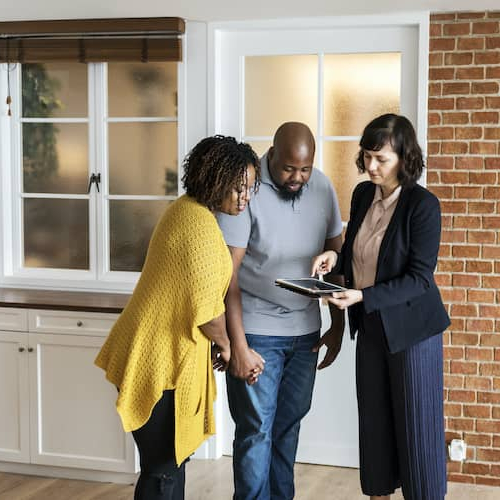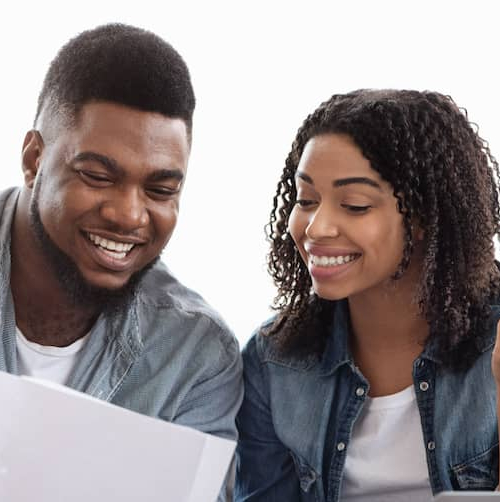How to buy a house with cash
Contributed by Sarah Henseler
Dec 23, 2025
•5-minute read

The average home buyer doesn’t have the money on hand to buy a home with cash and most need financing. In 2024, only 32.6% of U.S. homes were purchased with cash, down from 35.1% in 2023. The total number of all-cash home purchases reached its lowest in at least a decade. However, there can also be benefits to being a cash home buyer if you do have the money in the bank.
If you’re concerned about not having all that money liquid, you can refinance with Rocket Mortgage® if you need to pull money out of the property down the line. Here’s what you need to know about buying a house with cash along with the upsides and downsides of not getting a mortgage.
Key takeaways
- Cash home buying has declined but still offers unique advantages. While fewer U.S. homes are being purchased with cash than in recent years, paying in cash can still provide meaningful benefits for buyers.
- The cash‑buying process is simpler because no mortgage is involved. Key steps include hiring a real estate agent, providing proof of funds, negotiating the purchase price, completing a home inspection and closing on the home.
- Buying with cash can create a stronger offer and lower overall costs. Cash buyers may appeal more to sellers, avoid mortgage payments and interest, reduce closing costs and enjoy a faster, more streamlined closing process.
How to buy a house with cash in 5 steps
Parts of process of buying a home with cash are similar to buying a home with financing. However, buying with cash is more streamlined because you don’t have to go through the steps of working with a lender to take out a loan.
1. Hire a real estate professional
Even if you don’t need a lender, it’s advisable to hire a real estate agent to help you with the rest of the home buying process. A good real estate agent will have the experience and expertise to help you find the right home, make an offer, negotiate the price, and close on the deal. A cash offer can be more appealing to sellers than one that requires mortgage approval, and your real estate agent can help you leverage that to your advantage.
2. Acquire proof of funds
Cash buyers are required to acquire proof of funds, also known as a POF letter, from their financial institution when submitting an offer. This document proves how much money they have available. Understandably, sellers need some evidence that the buyer does in fact have the money on hand to purchase the home in cash. Proof of funding can also come in the form of bank statements, a line of credit approval letter, or other certified financial statements. 401(k) and other retirement account statements typically do not qualify as proof of funds for a cash offer.
3. Negotiate the price
Your real estate agent can also help you negotiate the sales price of the house, monitor housing market conditions, and work with you to make a competitive offer.
A savvy real estate agent will also know how to pitch your cash offer as advantageous to the seller to get a good price. Buyers often include contingencies in their offer to protect themselves from having to go through with the deal if certain things go wrong. One common condition that buyers include in their purchase agreement is a mortgage contingency, which allows them to back out of the deal if they cannot secure financing. With a cash offer, you can waive this contingency, thereby making your offer more competitive. Your real estate agent can help you figure out which contingencies you need and which you don’t.
4. Hire a professional home inspector
Mortgage or no mortgage, a home inspection is always a good idea. During a home inspection, a licensed inspector carefully examines the home and takes note of any damage, broken systems, safety or health hazards. That way, you have a better understanding of the condition of the home before you buy it. Otherwise, you’ll inherit any issues with the home when you buy it and have to cover the costs of repairs.
If you aren’t getting a mortgage, you won’t have a lender that requires an appraisal. However, it may be useful to have one done anyway so that you can confirm the fair market value of the home matches the price you’re paying.
5. Close on the house
On closing day, you’ll sign all the required documents, make your down payment, and pay your closing costs. These payments typically are submitted via wire transfer or cashier’s check. When you pay cash for a home, you’ll save on the closing costs that come from originating and finalizing a mortgage. The title will be transferred to your name and you’ll be handed the keys to your new home.
Can you buy a house in cash even if you have bad credit?
Yes. If you’re buying a house with cash and don’t need to get a mortgage, then you won’t need to meet a lender’s credit requirements. However, if you have bad credit because you’re carrying other debts, it may be a better use of the cash you have on hand to pay off those debts.
Pros of paying cash for a house
In many cases, the upsides of paying cash for a house can outweigh the downsides. Here are some ways that being a cash home buyer can be beneficial:
- Cash offers are attractive to sellers. Sellers often prefer to work with cash buyers if they can because they don’t have to worry about a buyer’s financing falling through at the last minute. Cash offers often tend to close sooner, which can be helpful to sellers who are eager to sell.
- There are no mortgage payments or interest accrued. Not having a monthly housing payment is a big perk that can reduce financial pressure and allow you to expand other sides of your budget. Skipping the mortgage process also means you avoid paying interest and fees.
- Closing costs are lower. When you get a mortgage, your lender will charge you for certain loan fees that add to the amount you’ll owe at closing. When you pay in cash, you won’t have to deal with lender-related closing costs.
- Closing is fast and simple. When you purchase a home with a mortgage, the closing process can take over a month because your lender has to process, underwrite, and approve your loan. When you buy with cash, it’s possible to close on a home in as little as a week or two.
- You have full ownership of the home immediately. When you own your home outright, you have full equity and don’t have to worry about keeping up with mortgage payments.
Cons of paying cash for a house
Buying a house with cash can also come with potential downsides, such as:
- Your money is tied up in the house. Paying with cash means putting a large sum of money into an illiquid asset. If down the line you need to tap into that money, it’s more difficult to access. Putting that money into investments or bolstering your retirement savings might yield better returns.
- Additional expenses still apply. Just because you don’t have a mortgage doesn’t mean you’re completely free of regular housing-related payments. There will still be property taxes, homeowners insurance, utilities, and, if applicable, homeowners association (HOA) dues.
- There are fewer tax deductions. When you you’re paying a mortgage, you can write off the interest you pay at tax time.
The bottom line: Should you buy a house with cash?
Buying a house with cash requires a substantial up-front investment but can save you money in the long run. You won’t have to worry about mortgage payments and you’ll save a considerable amount in interest. However, it might not be worth it if it means completely wiping out all of your savings to buy with cash. While you’ll have full equity right away, be mindful that those funds won’t be liquid.
Ready to get started with the home buying process? Start your mortgage approval online with Rocket Mortgage.
Refinancing may increase finance charges over the life of the loan.

Rory Arnold
Rory Arnold is a Los Angeles-based writer who has contributed to a variety of publications, including Quicken Loans, LowerMyBills, Ranker, Earth.com and JerseyDigs. He has also been quoted in The Atlantic. Rory received his Bachelor of Science in Media, Culture and Communication from New York University.
Related resources
7-minute read
What is cash to close?
In order to close on your house, you will need to bring cash to close the mortgage deal. Learn what expenses are included in your cash-to-close amount and mo...
Read more

6-minute read
How much do you need for a down payment on a house?
You might’ve heard you should make a 20% down payment on a house. However, it depends on several factors. Here’s how to determine the amount you ...
Read more

8-minute read
How to buy a house with no money down
Some mortgages allow you to buy a house with no money down. Learn how to buy a house with n...
Read more